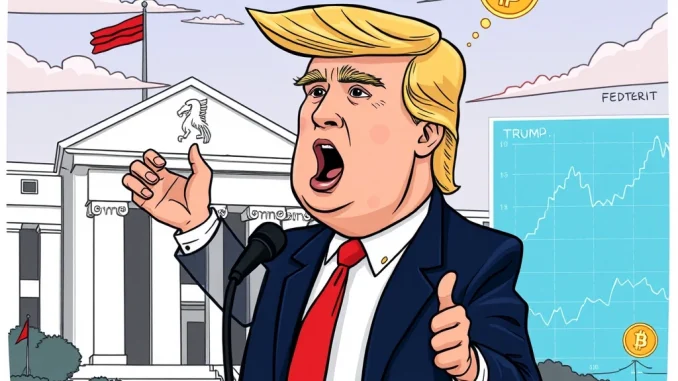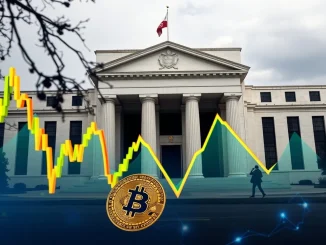
For those navigating the dynamic world of digital assets, understanding the broader economic landscape is crucial. Recently, significant Trump Fed criticism surfaced, potentially signaling shifts that could ripple through traditional finance and, by extension, the crypto market.
What’s Behind the Trump Fed Criticism?
Former U.S. President Donald Trump has once again voiced strong disapproval of the Federal Reserve’s actions. According to a report by Watcher Guru on X, Trump labeled the central bank a “disaster” and called for a drastic 100 basis point reduction in interest rates. This isn’t the first time Trump has publicly pressured the Fed, advocating for lower rates during his presidency to stimulate economic growth.
A 100 basis point interest rate cut is significant. To put it in perspective, 100 basis points equals a full one percent. Such a move would represent a substantial easing of monetary policy, aimed at making borrowing cheaper for businesses and consumers, theoretically boosting spending and investment.
Why Does the Federal Reserve Matter to Anyone?
The Federal Reserve, often called the Fed, is the central banking system of the United States. Its primary roles include managing the nation’s monetary policy, supervising and regulating banks, maintaining financial stability, and providing financial services. Its decisions, particularly on interest rates, have a profound impact on the economy:
- Borrowing Costs: Affects mortgage rates, car loans, business loans, and credit card interest.
- Inflation: Can influence the pace of price increases.
- Employment: Aims to foster maximum employment.
- Investment: Impacts the attractiveness of different asset classes.
Traditionally, the Fed operates independently of political pressure to make decisions based purely on economic data and mandates. However, political figures often comment on or criticize its actions.
How Could a Massive Interest Rate Cut Impact Markets?
A substantial reduction in interest rates typically has several effects on financial markets:
- Stock Market: Lower borrowing costs can boost company profits and make stocks more attractive relative to bonds.
- Bond Market: Existing bonds with higher yields become more valuable, while new bonds are issued at lower rates.
- Currency: Lower rates can sometimes weaken a nation’s currency as foreign investors seek higher yields elsewhere.
- Real Estate: Lower mortgage rates can make buying property more affordable, potentially boosting the housing market.
The demand for a 100 basis point cut is particularly noteworthy because such large, sudden moves are usually reserved for times of significant economic crisis or distress, not standard policy adjustments.
Connecting the Dots: Fed Policy and the Crypto Market
So, how does the Federal Reserve‘s monetary policy, and specifically calls for a significant interest rate cut, relate to the crypto market? The connection is multi-layered:
- Risk Appetite: Lower interest rates make ‘safer’ investments like savings accounts and government bonds less appealing due to lower returns. This can push investors towards ‘riskier’ assets that offer the potential for higher returns, including stocks and cryptocurrencies. Cheaper money can flow into speculative markets.
- Inflation Hedges: Persistent criticism of central banks and aggressive money-printing policies can fuel concerns about inflation and the devaluation of traditional fiat currencies. Assets like Bitcoin are sometimes viewed as potential hedges against inflation or alternatives to traditional financial systems, aligning with the decentralized ethos that contrasts with centralized control by entities like the Federal Reserve.
- Economic Sentiment: Political commentary and the economic outlook influenced by monetary policy can affect overall investor confidence. Positive sentiment (perhaps driven by perceived economic stimulus from lower rates) could benefit risk assets like crypto, while uncertainty (perhaps from political interference in the Fed) could lead to caution.
- Liquidity: Easing monetary policy generally increases liquidity in the financial system, which can find its way into various asset classes, including the crypto market.
While not a direct one-to-one correlation, macro-economic factors heavily influenced by the Federal Reserve‘s decisions play a significant role in shaping the environment in which the crypto market operates.
Is Political Pressure on the Fed a Challenge or an Opportunity for Crypto?
Political calls for specific actions, like a massive interest rate cut, highlight a key difference between centralized financial systems and decentralized ones. Critics of central banking often point to the potential for political influence to override sound economic principles, leading to policies that benefit specific agendas rather than long-term stability.
For proponents of decentralized currencies, such events can serve as a validation of the need for systems like Bitcoin, which are designed to be immune to political manipulation and arbitrary changes in monetary policy. This narrative could potentially attract more interest in crypto as an alternative.
However, increased economic volatility or uncertainty caused by political interference could also lead investors to retreat from all risk assets, including crypto, in favor of perceived safety. The impact is complex and depends on how investors interpret the news and the broader economic reaction.
Actionable Insights for Crypto Enthusiasts
Given the potential influence of Federal Reserve actions and political commentary on the economy and the crypto market, what should crypto holders consider?
- Stay Informed: Pay attention to macro-economic news, especially regarding inflation, interest rates, and central bank policies. These factors create the backdrop for crypto market movements.
- Understand Correlations: While crypto has its unique drivers, it is not entirely decoupled from traditional finance. Observe how different asset classes react to Fed announcements and economic data.
- Long-Term Perspective: Day-to-day political commentary might cause short-term fluctuations. A long-term investment strategy based on the fundamentals of blockchain technology and specific projects is often more resilient.
- Diversification: Consider how your overall portfolio is structured, understanding that crypto is generally considered a higher-risk asset class.
The Trump Fed criticism serves as a reminder that the world of finance is interconnected. Decisions and statements emanating from powerful institutions and political figures can send ripples across markets, ultimately influencing the environment for digital assets.
Summary: Why Fed Talk Matters to Crypto
Donald Trump’s recent harsh Trump Fed criticism and demand for a significant 100 basis point interest rate cut highlight the ongoing debate around the Federal Reserve‘s monetary policy. While seemingly focused on traditional economics, such calls for aggressive easing could have implications for the crypto market. Lower rates can increase liquidity and risk appetite, potentially benefiting crypto. Furthermore, criticism of centralized monetary control can reinforce the value proposition of decentralized digital assets. Staying informed about these macro-economic developments is vital for navigating the complex relationship between traditional finance and the evolving crypto market.



